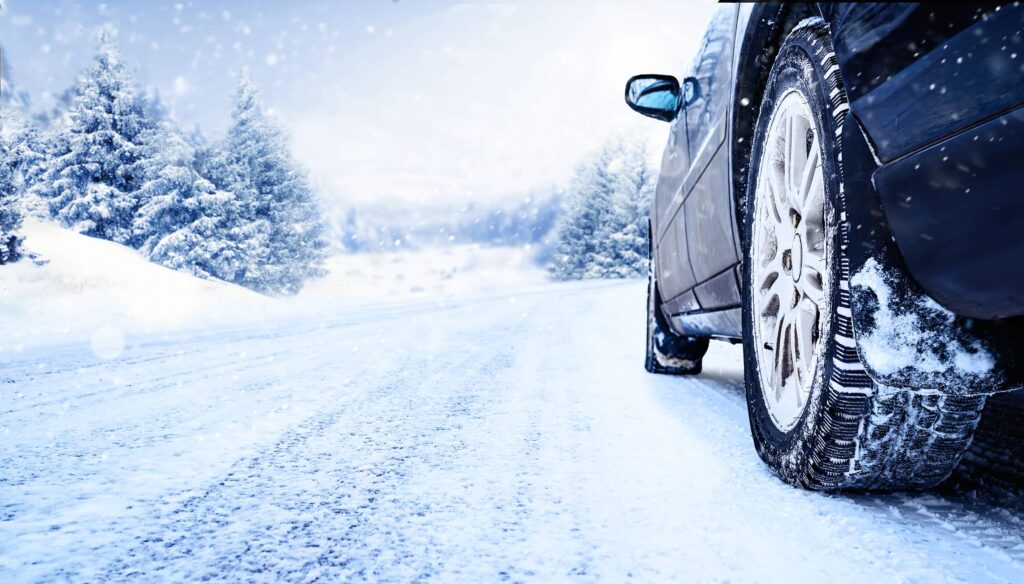
Winter is right around the corner! Preparing your car for the season is essential for staying safe and avoiding unexpected breakdowns. As temperatures drop, cold weather can have a significant impact on your vehicle’s performance.
At Gurney’s Automotive Repair, we’ve got you covered with tips and expert advice to help you get your car ready for winter, ensuring it runs smoothly and safely all season long.
1. Tires: Your First Line of Defense
Your tires are one of the most critical components when it comes to winter driving. As temperatures fall, the rubber in tires can become less flexible, which can lead to reduced traction on icy or wet roads. It’s essential to ensure that your tires have adequate tread depth for optimal grip.
While the legal minimum tread depth is 2/32 of an inch, we recommend having at least 4/32 of an inch for better performance on slippery surfaces. Additionally, make sure to properly inflate your tires, as under-inflated tires can decrease your vehicle’s handling. A quick tire check now can help you avoid problems later. If your tires need replacing, getting them serviced early can save you from unnecessary risk during the colder months.
2. Wiper Blades and Windshield Washer Fluid
Winter storms often bring heavy rain, snow, and ice, which can reduce visibility. To keep your windshield clear, it’s important to replace worn wiper blades. A pair of well-maintained blades ensures that your visibility stays clear even in the harshest conditions.
In addition to wiper blades, make sure to fill your windshield washer fluid reservoir. Opt for a winter-grade fluid that helps to remove snow and ice from the windshield. This simple but essential maintenance task makes a huge difference when you’re in a storm.
3. Battery Health: Don’t Get Stranded
Cold weather can put extra stress on your vehicle’s battery, especially if it’s older or weak. If your battery is showing signs of wear or if it’s been a few years since the last replacement, consider getting it tested. A weak battery in winter can leave you stranded when you least expect it.
Replacing an aging battery before the cold sets in ensures you’re not left with a dead car on a frosty morning. Keeping an eye on your battery’s health now can save you from potential headaches down the road.
4. Brakes: Ensuring Safety in Wet Conditions
Your braking system is essential, especially when dealing with winter driving conditions like ice or rain. If your brakes are worn, stopping distances will increase, making it harder to avoid an accident in slippery conditions.
Before the winter season arrives, it’s wise to have your brakes inspected. Checking the brake pads, fluid levels, and overall performance ensures that your brakes are responsive when you need them most. A well-maintained brake system will keep you safer and more confident when driving on unpredictable roads.
5. Fluids: The Lifeblood of Your Vehicle
Your car relies on several essential fluids to keep it running smoothly. In cold temperatures, fluids such as engine oil, transmission fluid, brake fluid, and coolant can thicken. This may hinder your car’s performance.
It’s crucial to check fluid levels and ensure that everything is in proper working order before the winter chill sets in. Keeping your vehicle’s fluids at optimal levels will prevent issues like overheating or engine strain, and ensure smooth performance in cold conditions.
6. Lights: Stay Visible on the Road
Winter months often bring shorter days and longer nights, meaning that visibility is a major concern when driving. It’s essential to check that all your vehicle’s lights—headlights, taillights, brake lights, and turn signals—are working properly.
Dim or malfunctioning lights can make it harder for other drivers to see you, especially during rain or snow. Keeping your lights in top condition helps improve your safety and ensures that other drivers can easily spot you on the road. Take the time to inspect your lights before winter driving begins.
7. Emergency Kit: Be Prepared for the Unexpected
Winter weather can be unpredictable, and even the most prepared drivers can get caught in an emergency. Having an emergency kit in your car can make a significant difference if you’re stranded in bad weather or encounter a mechanical problem.
Your kit should include items such as a flashlight, extra batteries, a first-aid kit, non-perishable snacks, blankets, a snow scraper, and a portable phone charger. By assembling an emergency kit, you’ll be better equipped to handle any unforeseen situations during the winter months.
8. Heating and Defrosting Systems
Keeping your car’s interior warm and comfortable during winter is essential for both comfort and safety. Ensure that your heater and defroster are functioning properly, so you can keep the windshield clear and maintain a comfortable cabin temperature.
A well-working defroster will prevent your windshield from fogging up, giving you a clear view of the road. If you notice any issues with these systems, it’s a good idea to address them before you find yourself dealing with a freezing vehicle on a cold morning.
Get Your Car Ready for Winter
Winter driving can be challenging, but with the right maintenance and preparation, you can reduce the risks and make your driving experience much safer. From checking your tires and inspecting your battery to ensuring your brakes are in top shape, getting your vehicle ready for the colder months is crucial.
If you’re not sure where to start or need assistance with any winter maintenance tasks, our team at Gurney’s Automotive Repair is here to help. We commit to keeping your car running smoothly and safely, no matter what the weather brings. Schedule your appointment with us today and let’s make sure your vehicle is totally ready for winter. Stay safe on the roads this season!


